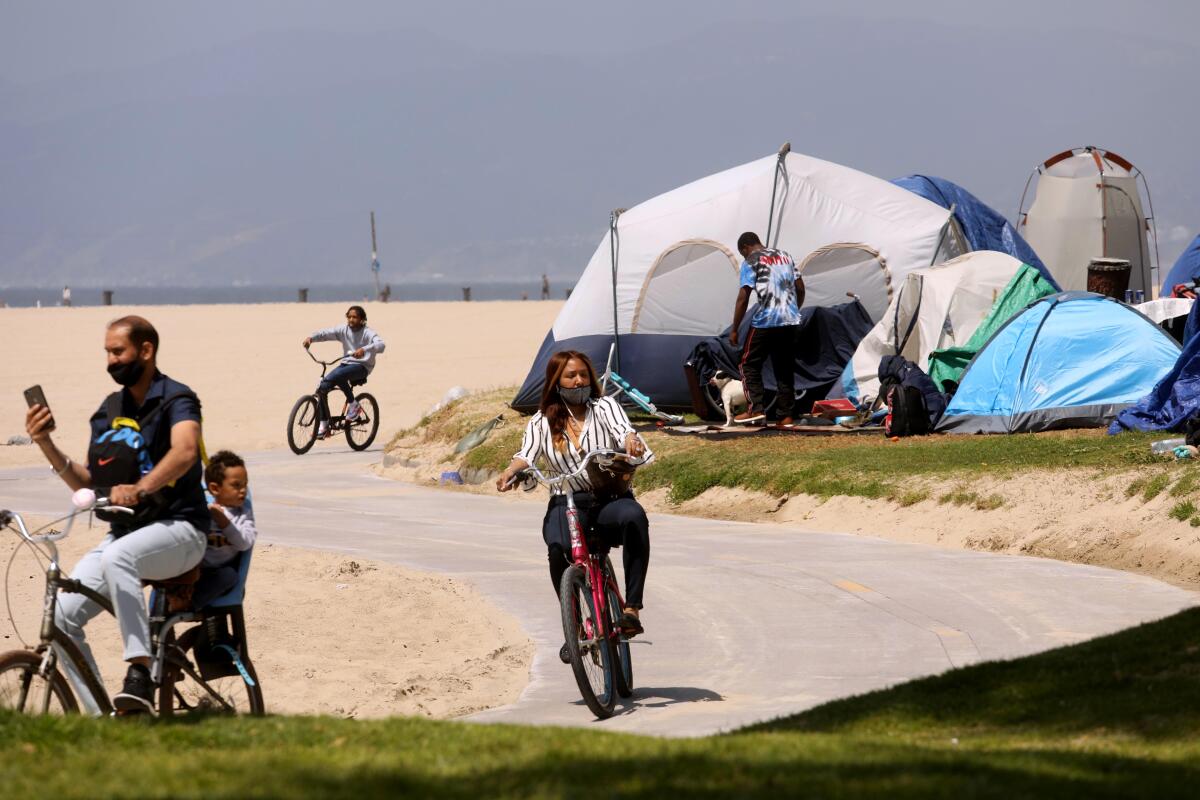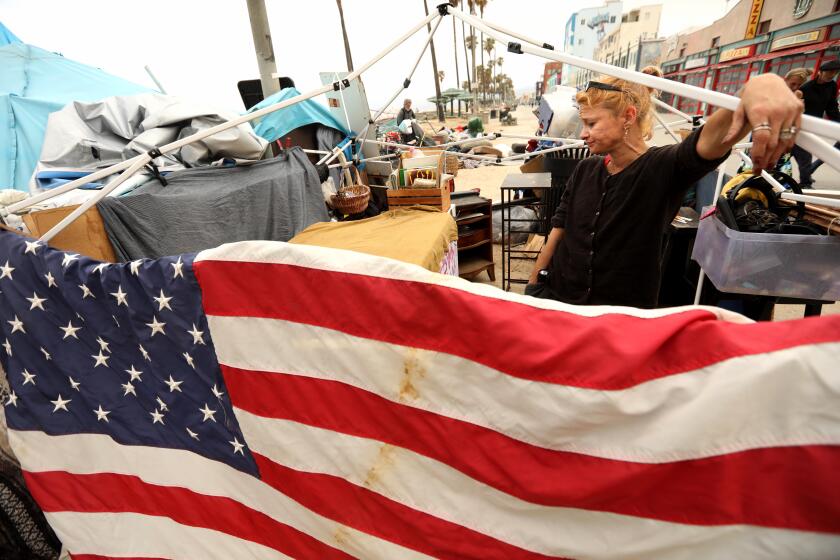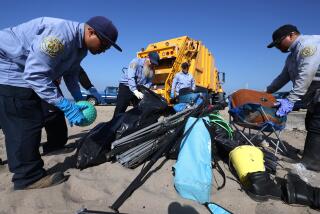Push to clear homeless camps from Venice Beach gears up

Outreach workers on Friday wrapped up the first — and easiest — phase of the Venice Beach cleanup, persuading dozens of homeless people camped on the boardwalk to move into shelters.
As the cleanup plan got underway, an anticipated crackdown by Los Angeles County sheriff’s deputies never materialized. Sheriff Alex Villanueva on Wednesday walked back earlier comments that were widely interpreted as a threat to arrest anyone still on the boardwalk by July 4. Villanueva said in a press conference that he was expressing a hope, not a deadline.
Deputies from the Sheriff’s Homeless Outreach Services Team, who had patrolled the boardwalk earlier in June, stayed away as the outreach began.
St. Joseph Center, the lead agency in the encampment-to-housing program, reported Friday morning that 72 people had left Ocean Front Walk, the concrete promenade commonly known as the boardwalk, and the earthen berm next to it where about 200 tents had accumulated. The initial effort concentrated on tents scattered over the south end of the boardwalk between Windward Avenue and Park Court. The agency said three had received permanent housing but did not say where the others were placed.
A plan for how to solve Venice’s homeless crisis has emerged from behind-the-scenes talks among a coalition of Venice activists, city officials and deputies of the area’s city councilman.
St. Joseph Center said it had engaged 186 people, meaning they were receiving services such as document assistance and referral to housing or mental health. The outreach is scheduled to resume Tuesday, when the agency will shift to the more difficult north end where tents are more concentrated.
Fliers posted by the city outlined a five-week “phased resumption of normal operations” with a “comprehensive beachfront cleaning” of the area, which is under the jurisdiction of the city Recreation and Parks Department. The warning said the “unhoused residents currently living in the park will be offered housing.”
It did not say what would happen if they declined, but “normal operations” implied the enforcement of a city law prohibiting overnight camping in parks.
Several camp dwellers near the Santa Monica border said they knew about the warning but planned to stay put.
“I’m waiting for July 4 to see,” said Malik Aljubaydi, who lay on a mattress under the shade of his lean-to. “I don’t want to leave here. I’m an artist.”
Venice has become the most recent focal point of tensions over homelessness in Los Angeles. Residents of the beachside community have grown increasingly alarmed by the proliferation of tents both on the beach and farther inland, particularly on streets near a city homeless shelter. Videos of fights, fires and mounds of trash have proliferated on social media.
Facing intense criticism from constituents, Councilman Mike Bonin last month said that conditions on the boardwalk were intolerable and had to end. Bonin announced a plan that closely mirrored one put forward by neighborhood groups in January proposing intensive outreach to clear the encampments in phases.
L.A. City Councilman Mike Bonin lays out his vision of how a humane clearing of tents that run along the Venice boardwalk could occur.
Under the close watch of homeless advocates, resident activists and news media, outreach workers from St. Joseph Center, followed by city sanitation crews, removed all vestiges of encampments from Windward to just south of Park, but left one especially large group of tents standing there, said Peggy Lee Kennedy of the group Venice Justice Committee.
Kennedy said she was skeptical that all the people who agreed to shelter placements would stay.
She said she had heard from a friend of a woman suffering from several mental illnesses that she left the hotel she was placed in because “there were 27-foot spiders in the room.”
Kennedy said she saw sanitation crews destroy property that was unattended but also praised them for agreeing to store the possessions of Dixie Moore, whose photo was prominently featured in a Times article. She was relocated to the Cadillac Hotel, a boardwalk property where the city has leased rooms for the homeless under the program known as Project Roomkey.
“It was pretty cool,” Kennedy said.
The tenor of the first week was mellower than many had expected following Villanueva’s off-the-cuff press conference on the boardwalk in June, when he announced he was going to send deputies to address a problem that city leaders had allowed to spiral out of control. At the time, he said he would like to see the area cleared by July 4.
The threat drew an immediate backlash from city and county political leaders, homeless services agencies and the United Way of Greater Los Angeles, calling arrests of homeless people “equally destructive and pointless.”
A deployment followed, as 18 deputies walked the boardwalk in what turned out to be more of a media blitz than a crackdown. The HOST team, supplemented by deputies who specialize in mental health, talked to homeless people and urged them to go see St. Joseph outreach workers, issuing no tickets and making no arrests.
The deputies returned for the last time June 24.
More to Read
Sign up for Essential California
The most important California stories and recommendations in your inbox every morning.
You may occasionally receive promotional content from the Los Angeles Times.









